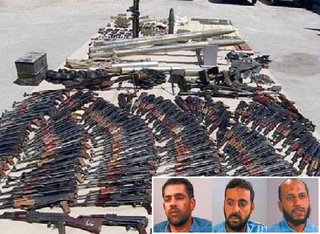Last night the Research Centre for Refugee Studies, located here in Amman, launced a week-long rememberance of the dispossession of 700,000 Palestinians of their homes and land, an day celebrated as Independence Day in Israel, but known as "al-Nakba", or the Catastrophe, to Palestinians and in the region.
The launch included screenings of three films. The first followed the life of a female Palestinian refugee in Lebanon who was detained in Israel's notorious al-Khiam prison. Khiam was the site of horrendous war crimes by both Israelis and their Lebanese allies in the SLA. It was a prison established in 1985 by the Israelis, which was subsequently turned over to their Lebanese allies.
One of the more interesting points of this film to me was when some of the former female detainees are talking about their Lebanese gaurds at the prison, gaurds who still live in nearby villages. One of the women says, "they look you right in the eye as if you're the guilty one."
I find it amazing that the Lebanese female guards, who contributed to the torture of these Palestinian refugee women, still live in the area, and that people haven't taken revenge on them. But also the brashness and arrogance of the gaurds feel no shame for abusing fellow human beings, looking at their former prisoners with such contempt, as if anyone deserves to be tortured. Lebanon has by far the worst record for its treatment of Palestinian refugees and still has not come to terms with this issue.
Another very moving moment in the movie is described well from a
Human Rights Watch report from the time:
On May 23, local residents stormed the notorious Khiam prison, which since its opening in 1985 had been a joint enterprise of Israel and the SLA. They routed the SLA jailers without violent incident and freed about 130 detainees, some of whom had been held without charge for fifteen years.
It was amazing to see the reunion of brothers, mothers and friends after all these years of seperation. The human spirit seeks freedom, and it is amazing to see it soar at the moment of its release. It should be a lesson to all those who oppress that no matter how long oppression and occupation lasts, people will never give up the struggle to be free.
A second movie was about the Israeli wall, called Three Ghettos, One Land, by the
Stop the Wall campaign. The film was really depressing, as the wall and the reality of the Palestinian Territories is, but it really remined me that Israel is intending to create three more Gaza's in the West Bank, one in the north centered around Nablus, a second in the center, around Ramallah, and a third in south around Hebron. This plan has been well known for years, but given how bad things have gotten in Gaza, it just struck more a bit harder last night what this will mean for the West Bank.
I don't know if there is another word to describe it other then ghetto. They may not ghettos in an urban sense, but they most certainly are in a national sense. They will consist mostly of Palestinian population centers, cut off from as much land as possible, and enclosed and intersected by Israeli walls and bypass roads. Movement in and out of these zones will be entirely controled by Israel.
Here is a map that maybe best shows how the future Palestine will look. Here is another map that shows
the Israeli-only bypass roads that fully crisscross and cut these zones into even smaller isolated pieces. How is that the basis of a viable state?
Al-Hayat reports that Israeli Prime Minster Ehud Olmert is preparing for a trip to Washington to seek President Bush's assurance that the US will support his disengagement plan as setting the final borders for the Jewish state. Israeli sources are trying to downplay any high expectations, but Washington will agree eventually, and will pay for it too.
Cultural note:
The Middle East is not all conflict. There is actually a lot of life outside of conflict. So another aspect of the launch was the sale of Palestinian national and cultural items. Among the most noteworthy displays was from
Azkadunya, or The Other Arabia, as they translate it. According to the site, Azkadunya is, "an alternative non-profit distribution network for the promotion, marketing, and sale of non-commercial cultural production by individuals, organizations, or educational and cultural initiatives in the Arab world or in the Arabic language."
Unfortunately, the site is only available in Arabic, because people in the West are in desperate need of better outlets to Arab culture. Hopefully the set up an English-language mirror site. But they had a number of CDs for sale produced by the
National Conservatory of Music, at Birzeit University in Palestine, which does have a good English language site. I'll be adding both to my "cultural links" space in the right sidebar.



